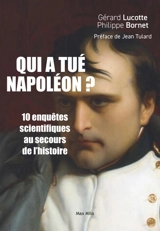
Who killed Napoléon? : 10 new scientific investigations to rescue history
Gérard Lucotte , Philippe Bornet
Versailles, Lyon 2ᵉ, Lyon 6ᵉ...
Ce que dit l'éditeurWho killed napoleon ? 10 New Scientific Investigations to Rescue History « Let the muse of history be silent, and let genetics take over ». « Fascinating » Jean-Noël Fabiani, Professor Emeritus, Chair of the History of Medicine Until recent years, many mysteries and rumors have surrounded Napoleon : was Napoleon's body taken by the British and placed in Westminster Abbey ? Was he poisoned with arsenic ? Did he die of hereditary stomach cancer, as the English claimed, or of the hepatitis and dysentery rampant on this insalubrious island ? Was Napoleon III descended from the Emperor ? Did the Emperor's physician remove Napoleon's penis after his death on St. Helena in 1821 ? To answer these and many other questions, Professor Gérard Lucotte spent twelve years working on the subject. He was commissioned by Prince Charles Napoleon (a descendant of the Emperor through the branch descended from Jérôme Bonaparte, the Emperor's youngest brother) and Count Walewski (a descendant of Napoleon I's natural son) to work on Napoleon's DNA. Thanks to his genetics laboratory and electron microscope, he has achieved a gigantic feat that will astound all Napoleon enthusiasts. |
RésuméS'appuyant sur douze années de recherche sur l'ADN de Napoléon, les auteurs répondent à de nombreuses questions jusqu'ici restées sans réponses sur le personnage, notamment le lieu de sa dépouille, la cause de sa mort et ses descendants. ©Electre 2025 |
Caractéristiques Auteur(s) Éditeur(s) Date de parution
4 novembre 2024
Rayon
Histoire de France
Contributeur(s) Jean Tulard
(Préfacier) EAN
9782315021703
Nombre de pages
256
pages
Reliure
Broché
Dimensions
21.0
cm x
15.0
cm x
1.7
cm
Poids
238
g
|
















